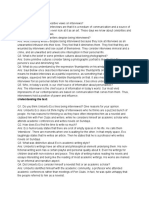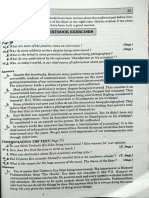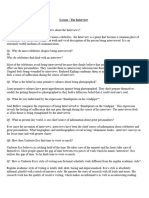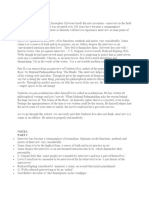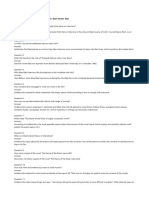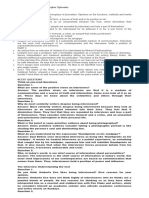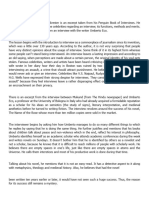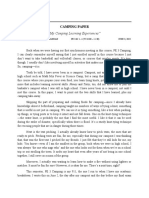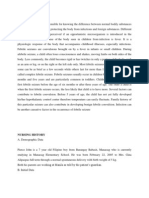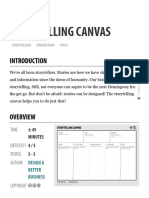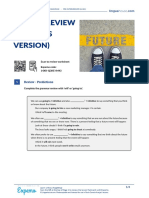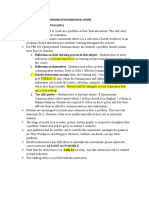Interview
By
Christopher Silvester
Theme
"The Interview" explores the nature, significance, and controversy surrounding interviews
as a journalistic and literary genre.
The chapter presents multiple perspectives—some view interviews as a powerful tool for
knowing famous personalities, while others see it as intrusive, often misrepresenting people.
Q1 What are some of the positive views on interviews?
Ans 1 Interview is a genre that became a commonplace of journalism within thirteen to fourteen
decades of its invention. It is an art that brings out true and vivid delineation of the interviewee.
It is an extremely useful medium of communication.
Q 2 Why do most celebrity writers despise being interviewed?
Ans 2 Most of the celebrities shun interviews as they believe that interviews leave a disparaging
effect on their personalities. They also consider them to be an encroachment on their privacy.
Writers like V.S. Naipaul feel being wounded by interviews and losing a part of themselves.
Rudyard Kipling condemns them as immoral, an offence, a crime and something vile and
cowardly. Saul Bellow feels a sense of suffocation during the course of interviews.
Q3 What is the belief in some primitive cultures about being photographed?
Ans 3 Some primitive cultures view photography with a great sense of apprehension. They do
not like to get themselves photographed as they have a fallacious belief that it would rob them of
their very soul.
Q4 What do you understand by the expression thumbprints on the windpipe.
Ans 4 It is an expression which reveals how unemy aut suffocated the celebrity felt during the
course of an interview The interviewee feels as though pressure is being exerted on windpipe
(throat) by the interviewer as if he is being strangulated.
Q5 How is Umberto Eco's style of writing non-fictional scholarly work different from the regular
academic style?
�Ans 5 Regular academic style is depersonalised, dull, drab and boring in contrast, Umberto Eco
has an absolutely informal playful style with the narrative aspect he tells the story of his research
with all trials and errors. This gives his research work the quality of creative writing it makes an
informative as well as an interesting piece to read.
Q 6. What is the reason for the huge success of the novel "The Name of the Rose"?
Ans 6 The reason behind the success of "The Name of the Rose" cannot be pinpointed, as
Umberto Eco himself calls its success a mystery. Probably this detective story, delving into
metaphysics, theology and medieval history, interested the readers as it was written at the most
appropriate time, when the readers both understood and enjoyed it in spite of it being on a
difficult subject.
Q What are the drawbacks of an Interview?
Ans 7 Interview is an encroachment upon an individual's privacy Most of the times it is an ordeal
for the celebrity. At times it is condemned for its 'diminishing effect'; at times it is dreaded
because it 'lionizes’ the subject. Sometimes it 'wounds’ and at & other times it 'robs' one of a
part of oneself.
Q 8 Why is interview a supremely serviceable medium of communication despite its drawbacks?
Ans 8 Despite all its drawbacks, interview is a serviceable medium of communication as it gives
us a peep into the mind of a celebrity, The revelations made through this medium are truthful,
sincere and vivid and they help us to understand the working of a creative mind.
Long Answer
Q1. Are the different celebrities in the “ The Interview” justified in condemning interviews?
Ans 1 Celebrities like V.S. Naipaul, Lewis Carroll, Saul Bellow and H. G. Wells have expressed
strong dislike for interviews. They go to the extent of calling them immoral - a crime', 'an
assault' and the like. There is no denying the fact that the interviews, in some way, encroach upon
their privacy and at times project them to be shorter than their stature and ata times lionize them.
In spite of these drawbacks, there is no justification in condemning interviews outright after all
interviews give us an insight into the personalities of the celebrities. They bring out truth and
they inspire the masses. The fan-following the celebrities gets a pleasure and satisfaction in
having a glimpse of their heroes' inner selves from such close quarters. Interviews leave behind
indelible and vivid impressions and they are undoubtedly a 'supremely serviceable medium of
communi Hence, they do not deserve to be condemned altogether.
Q2 tThough Eco Identified himself with academic community, his taste for narration was there
right from the beginning and it sustained itself throughout. Comment.
�Ans 2 Despite getting spectacular fame as a novelist, Eco always associated himself with
academic community. His non-fictional work occupied him for the first fifty years of his life.
However right from the beginning, his taste for the narrative was evident even in his scholarly
writings. When he submitted his first Doctoral dissertation, his professor was impressed with his
playful and personal style which was far removed from dull, drab and depersonalised traditional
manner of writing research. The narrative aspect of his dissertation was complimented and it was
published too. Ever since that time, Eco sustained this style and told the details of the story of his
research in his essays too. He used this style for the first time in a novel that he wrote at the age
of 50. This novel "The Name of the Rose", stormed the world and to the utter surprise of the
publishers and journalists, drew mass audience. His engrossing narration thus grew from his
initial scholarly pursuits and made way to his fictional works, too.





